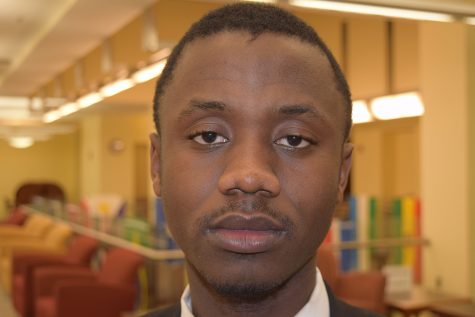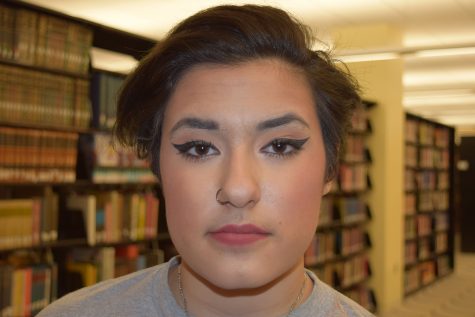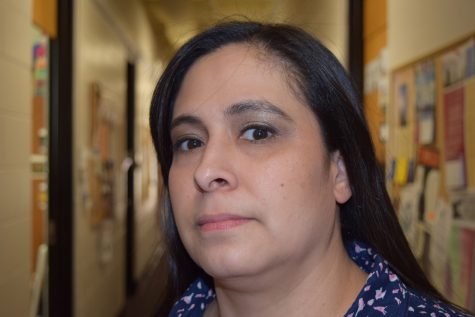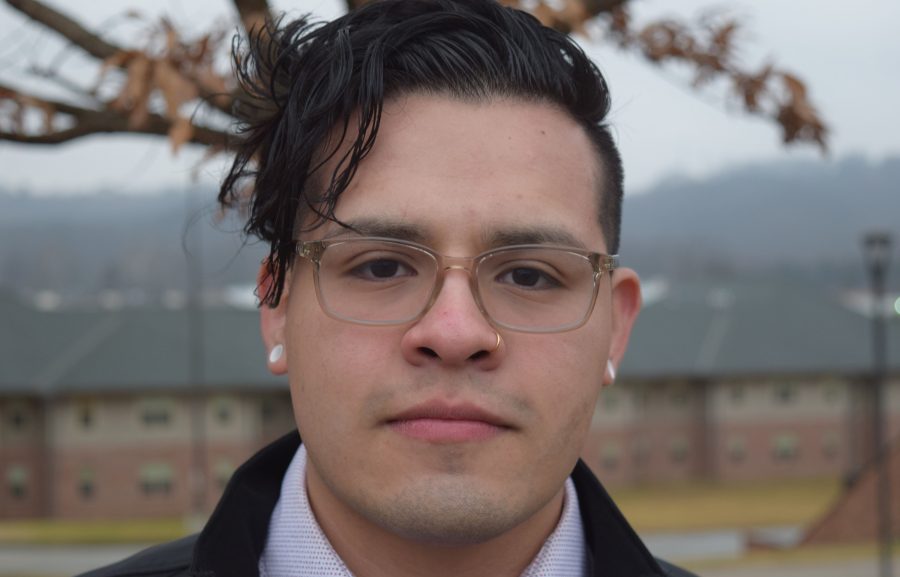The Human Side of Immigration
More than Lines Drawn on a Map
“For me it isn’t about ‘what does policy do at an abstract level?’” Lopez said. “The reality of my very existence at this institution, and every aspect of my life is in danger because of the words and actions of madmen.”
February 23, 2017
Many are concerned with the changes a Donald Trump presidency will bring as he and his administration begin their first year in office. These concerns dominate the news, are splattered all over social media and have drawn millions together in protests around the nation. As unifying as these concerns have been, they have also been a dividing force between political parties and people from different ethnic and social backgrounds. This is the first segment of a series that explores what people from different backgrounds are concerned about and why they are concerned.
The Undocumented Immigrant:
Leo Lopez is a humanities and sociology sophomore at IU Southeast.
He is also an undocumented immigrant from Mexico.
Lopez was born in Mexico where his family owned three small supermarkets. He said he remembered his family being well off when they lived there.
“We were in the upper echelon of the social class within the city,” Lopez said. “We attended private schools and ate at the really nice restaurants.”
His family lost everything to the widespread economic collapse that followed 9/11. They had to move in with one of Lopez’s uncles after losing their businesses and their home.
Lopez said it was while living there his mother had been told America was the land of opportunity. That it was the place where dreams come true.
When Lopez was 11 years old, he crossed the border illegally with his parents. They crossed at Douglas, Texas and wound up in Indiana because they had family who lived there.
Lopez said he is a man who walks in two worlds.
“I’ve been living in the U.S. for over 14 years,” Lopez said. “It’s more my homeland than the country I was born in, but it isn’t mine.”
He said many Americans take for granted things like driving to Wal-Mart, which could be a challenge or a danger to an illegal immigrant. If they were to get pulled over for a driving infraction, they would be caught without any kind of documentation and potentially deported.
“It’s always nerve wracking to have your parents go somewhere and have the fear of losing them,” Lopez said.
Up until a few years ago, Lopez said he went most of his life without having a right to gainful employment. All his life he had to lie; to work under assumed identities.
“I couldn’t attend college because you can’t go to college without a social security number,” Lopez said.
Lopez thanks Deferred Action for Childhood Arrivals and the DREAM Act for changing his life.
DACA is an executive order concerning immigration, issued by former President Barack Obama.
On June 15, 2012, the Secretary of Homeland Security announced that immigrants who came to the United States as children and meet several guidelines may request consideration of deferred action for a period of two years, subject to renewal. They are also eligible for work authorization.
The DREAM Act is a law that has not officially been passed as a federal law though it is in the works. It would make qualifying undocumented youth eligible for a 6 year long conditional path to citizenship which requires completion of a college degree or two years of military service.
For the first time in his life Lopez could get a driver’s license, work legally, get healthcare through his employment and attend college.
“Now I don’t have to worry about myself, but for how long?” Lopez said. “I have a two-year safety window, where every time I renew my permit I am still a legal resident. But only temporarily.”
DACA and other immigration policies that provide protections for immigrants already appear to be on the chopping block as Trump and Vice President Mike Pence settle into their new roles.
Lopez fears if both the program and his license expire within a Trump presidency he will be one of the first undocumented immigrants to be deported.
“My prints are in the system. I haven’t done anything bad but they know where I live. Where I work. What I do,” Lopez said. “I would lose my job immediately. I would lose my healthcare. I probably would not be able to continue to attend university without a job.”
Lopez said some people don’t understand why immigrants cannot just obtain citizenship or leave the country. He said they can’t move out of the country nor can they truly move into it because of regressive policy that has been instituted in the place of actual immigration reform.
“How do I not fear in terms of health care as well?” Lopez said.
Lopez was diagnosed with HIV at the end of 2013. He said as a person living with HIV there is a huge financial pressure to have health insurance.
“Your life is literally on the line,” Lopez said.
Lopez is concerned about possible reforms or the complete repeal of Obama’s healthcare law. Though he receives health care from his employer and not from “Obamacare,” it is possible he could be impacted in the future since HIV is a pre-existing condition.
He said it was “Obamacare” that made him eligible for insurance at an affordable rate. Through this legislation, the insurance companies could no longer increase his rates or deny him coverage due to his pre-existing condition. He is worried without “Obamacare” insurance companies would, again, be able to increase his insurance rates or refuse to cover him at all.
“What do I do at that point?” Lopez said. “It feels like I am literally at an impasse…It’s punishing.”
As Lopez watched the presidential race he said he recalled thinking the American public was far kinder than this.
“I expected the American people to vote for Hillary Clinton and usher in a new era of light,” Lopez said. “Disappointment crushed us.”
Though still disappointed, Lopez said he still believes in mankind.
Lopez said millions of people have proved there isn’t a reason to fear deportation because a large portion of the American people stand by the side of the oppressed. He believes they will not let the atrocities that occurred during past civil rights movements to happen again.
“I’m hopeful and vehemently so. I refuse to give into fear,” Lopez said. “Change will come and it will be ushered in by the hands of young people. That is where I must fight.”
Lopez encourages other illegal and undocumented immigrants to come out. He said when you introduce yourself to someone it can be very difficult to mention your immigrant status, explaining it is a thing of shame and it has always been so for his people.
“There is no shame in wanting better for your kids, yourself and the people that come after you. There should be no shame,” Lopez said.
When Lopez says he is an illegal immigrant, though undocumented, he declares it proudly.
“Even though there is a waver in my voice, I know my parents gave up dignity and took up the mantle of shame. Just so I could do better, “Lopez said. “I can’t afford to stay silent”
Lopez said fellow immigrants must come out about their immigration status.
“[The American people] cannot be allowed to believe we are rapist and murders,” Lopez said.
The Refugee:
Mark Jallayu, political science junior at IU Southeast, is a man of several titles.
He is the student body president and president of the Student Government Association.

He is a refugee.
He is a legal immigrant.
Jallayu came to the United States in 2006 to receive a better education.
“During the Liberian civil war that erupted in 1989, my family fled for neighboring Ivory Coast,” Jallayu said. “And there in a refugee camp called Peacetown, I was born. Not in a hospital, but in the camp.”
Jallayu’s parents told him of the struggles of trying to survive in a refugee camp where they lived until the war ended with the signing of the Accra Peace Accord in 2003.
“Life after the civil war was terrible,” Jallayu said. “Our schools were destroyed. We had to fetch water from a pumping station because our homes didn’t have running water. We didn’t have electricity in the home either, so we relied on lanterns and candles. Life was such a struggle that I was the only one out of my siblings to go to school.”
After years of struggling, Jallayu’s father asked his mother if he could go to America. She agreed to let her husband go so he could bring Jallayu with him to be educated in the U.S.
Since he has been here, Jallayu has been working on his education, so that he can return home, get a good job and make life better for his family.
Jallayu said he has doesn’t have fears of a Trump presidency or of his administration. He does, however, have a few concerns.
“The biggest reason I am concerned is because I have not seen this level of politics and this is not the America that is the envy of the world,” Jallayu said. “[Trump’s] campaign rhetoric told me that he was turning the tides in America politics. He was awakening the bitter sentiments that’s been swept under the carpet: this refusal of immigrants, of other’s religion, and other viewpoints.”
Jallayu said despite his concerns, he still has hope for America.
“It is and remains the greatest country known to mankind,” Jallayu said. “This is the America that has afforded me the opportunity to pursue secondary and tertiary education. The America that gave generations before me the chance at a better life. The America that embraces everyone, regardless of faith, status, or worth.”
Jallayu said sometimes he feels like it is not his place to speak on how a nation should run its immigrant program. He said he knows he is fortunate to have been able to come here because of the immigrant program.
“However, I will say this: immigrants are the backbone of this country,” Jallayu said. “And we are doing a disservice to humans and the United States by preventing immigrants from coming to this country.”
Jallayu said America closing its doors to refugees is an insult to American values.
“America is a humane country,” Jallayu said “It is a country that has not shut its door on those fleeing wars and oppression. America is a land that has welcomed refugees with open arms in the past.”
Jallayu said he thinks America should accept refugees from war-ravaged countries such as Syria. He said he also thinks other countries, including Syria’s Muslim neighbors, should also accept refugees.
“All countries have a part to play in helping those fleeing crises,” Jallayu said.
The Fourth Generation Descendant of an Immigrant:
Julia Adams, psychology freshman minoring in sociology, is the 112th great granddaughter of a Lebanese immigrant. She said her great grandfather has made her feel closer to her Arabic heritage.
Adams’ grandmother, whom she calls Sito, Arabic for grandmother, was the youngest of her great grandparents’ 10 children. It was her Sito who taught Adams how to cook Arabic food, dance to Arabic music and speak a few words in Lebanese Arabic dialect.
“I have never gone without wondering where I came from or what I represent,” Adams said. “Lebanon, though I may never be able to see it in person, will always have a special place in my heart.”

Adams said she has opposed Trump long before his election. She first became concerned by the way he labeled Mexican immigrants as criminals, druggies and rapists. She said those kinds of thoughts create a dangerous label for immigrants. One which lead some his supporters at rallies and outside of rallies attacking people of color and people of ethnic prominence.
“People need to realize that America was built on the backs of immigrants and continues to thrive off the work of immigrants,” Adams said.
Adams became even more alarmed when he became president and signed the executive order establishing a travel ban. She worries it will reach out to other countries such as Lebanon.
Adams said she feels the travel ban is a way to bank on the fear many Americans have, of those who are different than them, by putting them all under one label: terrorist.
Adams said people tend to be egocentric, meaning they believe that their experiences are what everyone else experiences.
“We take for granted our freedoms and privileges here that Syrians wish to have,” Adams said. “And when they try legally to come over and obtain those freedoms and privileges, it is 10 times harder than it should be. We should be taking in more refugees.”
According to Adams, she does not have much faith in Trump. She said she has hope in the citizens that speak out and resist heinous policies issued by the government.
“I have hope in people like Mark Jallayu, who came to America to pursue education and is doing great things,” Adams said. “I have hope in the immigrants who are giving the word immigrant a beautiful face.”
The Broader Scope on Immigration Issues
According to Veronica Medina, assistant sociology professor at IU Southeast, if you look at public opinion polls, a majority of Americans are opposed to many of the initial executive orders signed by Trump during his first month in office. Among them are the building of a border wall, the recently-halted refugee ban, rolling back regulations on corporate influence and regulations and repealing the Affordable Care Act.

“Many of my immigrant students are fearful for themselves and their loved ones,” Medina said. “Recent deportations, including the questionable detention of a DACA-protected individual, send a chilling message to the immigrant community and their allies.”
Medina said some who take hard-line stances against immigrants and refugees may have had limited exposure to these groups, may have had a negative encounter with a member of one of these communities or may have received misinformation about these groups.
“The best cure for this problem is to take advantage of opportunities to learn about these communities,” Medina said. “Recognize that there are significant social forces beyond these groups’ control that led to their arrival in your community in the first place.”
Medina said Immigration and refugee settlement results from a combination of push-and-pull factors.
“The individuals and families migrating from one country to another are making the best possible choice for themselves in the face of often undesirable or unfavorable circumstances,” Medina said.
According to Medina every immigrant and refugee group faces unique circumstances. She said it is incumbent to understand the historical and political contexts shaping any individual’s reason for coming here.
“Understanding the immigration system itself is important,” Medina said. “The argument for deporting undocumented immigrants is always about ‘following the rules’ and ‘getting in line.’ These statements oversimplify the processes involved in obtaining legal authorization to enter the U.S.”
Medina said for immigrants and refugees to obtain visas and other documentation, they endure a long, expensive, intensive and intrusive process. It is also a process that does not guarantee approval.
“Being in the U.S. without proper documentation is a civil offense, not a criminal act,” Medina said. “In the case of many DREAMERs and DACA-protected immigrants, some immigrants do not know they are unauthorized. They have, however, made positive contributions to their communities, have established families, enrolled in colleges and universities, and registered their existence in the desire to establish legal existences.”
According to Medina repealing or allowing DACA to expire, as well as removing DAPA protections, would be economically and socially dangerous. It would deprive the nation of stores of human capital and millions of economic contributors as well as tear families apart.
Medina said the conflation of refugees with immigrants creates hostility towards groups that have endured their own unique sets of hardships before even reaching American communities.
“Refugees are escaping from some of the most atrocious conditions and we hold extremely high expectations of them once they arrive,” Medina said. “Refugees receive extremely limited assistance to establish households in the U.S., primarily from private agencies, and are frequently relegated to the lowest employment ladders.”
Medina said a climate of hostility toward racial, religious, and cultural difference makes resettlement even more difficult. Many refugees may still experience trauma from the events or circumstances that caused them to flee in the first place.
Medina encourages people to take action; to help in any way they can.
“You don’t have to march in the streets to be heard,” Medina said. “We have seen very recently that contacting elected officials’ offices and registering opposition to or support for policies or people has influenced some members of Congress to change their votes.”
She said you can write letters to the editor for publication in your local newspapers, run for public office or campaign in support of a favored politician. You can also volunteer to assist communities most affected by donating clothing to refugee and immigrant centers, volunteering to be a language partner and holding fundraisers.
“Whatever you do, don’t be complacent,” Medina said. “Silence is violence.”


